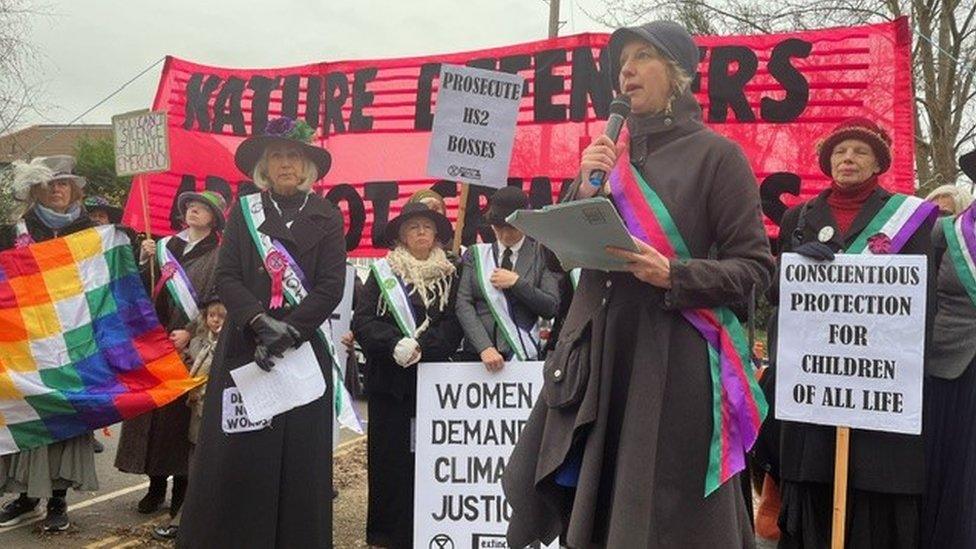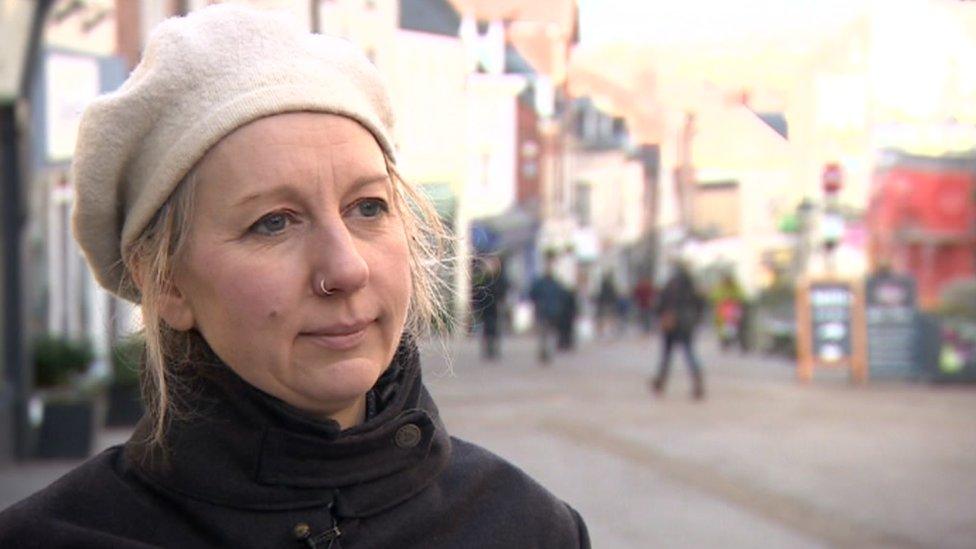Extinction Rebellion co-founder Gail Bradbrook sentenced
- Published

Gail Bradbrook (addressing spectators) was joined by a group of supporters dressed as suffragettes for Monday's sentencing hearing
The co-founder of Extinction Rebellion has received a 15-month suspended jail sentence after a marathon legal battle over her breaking a pane of glass.
Dr Gail Bradbrook was convicted last month of causing more than £27,500 of damage to the Department for Transport.
At Isleworth Crown Court, Judge Martin Edmunds KC said Bradbrook had a conscientious motive but that did not excuse her actions.
During the sentencing hearing, she accused judges of "mansplaining".
Bradbrook, from Stroud, Gloucestershire, was joined by a group of supporters dressed as suffragettes. In court, there was applause as the Extinction Rebellion (XR) activist finished her address to Judge Edmunds.
'Permission from nature'
In October 2019, during XR's second major protest that brought traffic chaos to parts of central London, Bradbrook climbed on to an entrance canopy at the headquarters of the Department for Transport (DfT).
She used tools to break a large pane of reinforced security glass, which cost £27,660 to replace.
During her police interview, she said she had been trying to stop crimes against humanity and "had permission from nature" to break the window.
Over two trials she tried to make similar arguments despite being repeatedly directed not to do so by the judge because none of them amounted to a defence that a jury could consider.
On Monday, Bradbrook told Judge Edmunds: "It can't be that there's compelling, objective evidence of a threat to life, and that's just completely irrelevant to the whole legal process.
"I know that is not what justice seeks to serve."

Bradbrook, pictured here causing criminal damage to the DfT window, could be jailed she commits another crime in the next 15 months
Bradbrook's case is one of scores linked to environmental protests since 2018 in which activists said damage, or serious disruption, caused as part of civil disobedience was legally justified.
She accused the courts in these cases of "condescension" and treating activists "as if we were acting in good faith but slightly deranged".
"I've had to listen to judges incorrectly characterising and, worse still, mansplaining the effectiveness of civil disobedience," she said.
Becoming tearful, she concluded: "God help us... life is being actively killed. We are compelled to act. The court systems of the UK are on trial, not myself.
"I wonder how history will judge this sentencing."
'Echo chamber of wishful thinking'
Judge Edmunds said Bradbrook had "actively sought" prosecution to attract publicity, and had wrongly tried to tell the jury that her actions had been legally necessary.
"As a matter of law, that was certainly incorrect for damage on this scale," he said.
"I put it down to an echo chamber of misinformation and wishful thinking. In many pre-trial hearings you accepted that the law did not provide you with a defence. Yet throughout, you have sought to avoid those penalties [for damaging the window] rather than accept them."

Dr Gail Bradbrook is a high-profile member of Extinction Rebellion, whose mission statement is to create a culture that is "healthy, resilient and adaptable"
Earlier this year the Court of Appeal ruled that judges hearing environmental protest cases should not evaluate the merits of the cause.
If a protester had been motivated by conscience, and the damage or disruption caused had not been excessive, judges were told to consider reducing the sentence.
Judge Edmunds said that the damage and disruption caused by Bradbrook meant she would have normally have been jailed.
But taking into account the Court of Appeal ruling and wider personal factors he suspended Bradbrook's prison sentence, meaning she could leave court a free woman - but could be jailed if she commits another crime in the next 15 months.
She was also ordered to also carry out 150 hours of unpaid work.

Listen to the best of BBC Radio London on Sounds and follow BBC London on Facebook, external, X, external and Instagram, external. Send your story ideas to hello.bbclondon@bbc.co.uk, external
- Published1 November 2023